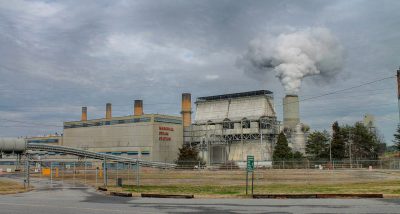Front Porch Blog
The Department of Environmental Quality is holding a public hearing on February 13 to receive input on the Special Order by Consent (SOC) for three of its power plants – Marshall, Allen and Cliffside. SOCs are agreements made between the DEQ and facilities that have been consistently unable to comply with their wastewater discharge permits. SOCs can be useful when they require polluters to address problems that cannot be fixed quickly. Unfortunately, SOCs can also be used to give polluters a free pass.
What: DEQ Public Hearing
When: February 13, 6 p.m.
Where: James W. Warren Citizens Center
115 West Main St., Lincolnton, N.C.

Roger Hollis speaks at the “1000 Days on Bottled Water” Rally. Photo by Kevin Ridder/Appalachian Voices
The seeps which Duke Energy received fines for are known as unengineered seeps (essentially leaks). The SOC addresses unengineered seeps, but DEQ plans to include engineered seeps (that are intentionally built) in the National Pollutant Discharge Elimination System (NPDES) permit. Previously, the state recognized engineered seeps as illegal discharges. In 2015, Duke Energy paid $102 million in fines for environmental crimes involving these same seeps. DEQ should not permit them now – it should continue to hold Duke accountable.
Currently, this SOC does not require Duke to test or treat the water, either by physical or chemical means, which could identify and mitigate the amount of contaminated water that is entering North Carolina waterways. The SOC should contain more detailed monitoring requirements and limitations so that adjustments can be before Duke Energy violates state surface water standards again.

Citizen Amy Brown signs in at a DEQ coal ash hearing about the Allen plant. Photo by J.M.Davidson/Appalachian Voices
This SOC is a overdue first step; however, it needs to contain more strict pollutant discharge limits and repercussions to hold Duke Energy accountable for contaminating water sources.
At this public hearing, DEQ is also seeking feedback on Duke Energy’s request for modification to its National Pollutant Discharge Elimination System (NPDES) permit for the Marshall Plant. The Marshall NPDES permit is the first permit under review by DEQ for a site that is covered by the SOC. Future NPDES permit adjustments are expected for Cliffside and Allen, as well as the rest of Duke Energy’s coal ash ponds. This is a precedent-setting action with statewide implications!
If you are interested in attending the public hearing, please contact ridge@appvoices.org. If you are unable to attend the public hearing you can submit your public comments online until February 14.
PREVIOUS
NEXT
Related News

Leave a comment
Your email address will not be published. Required fields are marked *



Leave a Comment